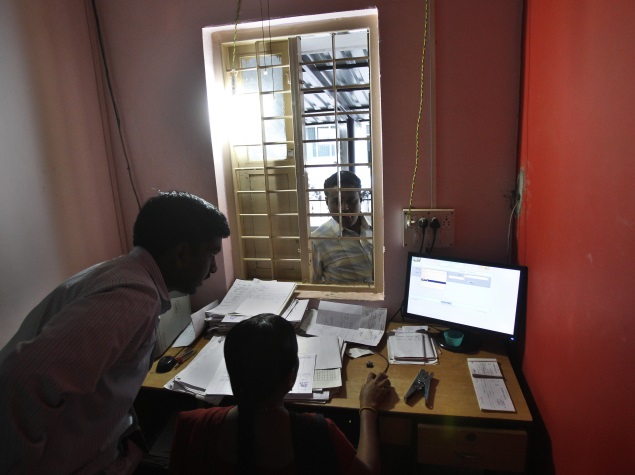- Home
- Internet
- Internet News
- Gujarat Government Websites to Get Face Lift, Connect to Social Media
Gujarat Government Websites to Get Face-Lift, Connect to Social Media

The state government has also directed all its departments to ensure that content of all its websites is in both Gujarati and English languages.
Apart from making websites more accurate, attractive and user-friendly, the government has also planned to make them more secure and participative, said Science and Technology department secretary Dhananjay Dwivedi.
"Our objective is to improve the overall content of the websites and deliver more reliable, trusted and updated information to users. We also want to streamline the entire process of website design. Thus, we have issued guidelines to all the departments to achieve this objective," he said.
Dwivedi's department recently formulated a comprehensive set of guidelines for integration of social media and for designing, maintaining, promoting, updating, developing, and securing the websites.
These guidelines have now been sent to government departments, boards, corporations and societies for their implementation and follow up.
One of the key features of the guidelines is the use of Gujarati language and use of social media platforms to promote the website and engage with users.
Now, all the departments will have to ensure that content of their website would be available in Gujarati as well as in English against the present case wherein several websites have only English text.
"Websites shall be bilingual (Gujarati and English). In case the current website is not bilingual, the respective organisation shall take necessary steps to render it bilingual within six months", stated the guideline document sent to
various departments. The departments have also been asked to integrate various social media platforms into their websites. These platforms, such as Facebook and Twitter, should also be used to promote the website, stated the guidelines.
"Just like websites, social media has become one of the means to reach out to people and tell them about various government schemes. It also enables us to get quick feedback and establish dialogue with stakeholders. Thus, we have also decided to enhance our presence on the social media for greater engagement," said Dwivedi.
The guidelines also put an extra emphasis on regular updates. Now, the departments will be required to update their website once every 15 days and also have to regularly monitor and assess the content to ensure authenticity and eliminate duplication.
To carry out these tasks, the government has also permitted these departments to appoint a nodal officer to suggest necessary changes and modification time to time. Apart from the nodal officer, the departments have also been given permission to appoint a designated officer for regular monitoring of website performance, security, and availability.
He is also required to supervise periodic security audit and conduct analysis of website traffic as well as to provide feedback to the development team, as per the guidelines.
Just like corporates who give a special emphasis on ensuring that the website user visits it again, the guidelines also asked the departments to keep the content on the portals engaging and user-friendly.
"The content of the website should be kept user-friendly, attractive and informative for maintaining stake-holder's interest for re-visiting the website," stated the guidelines.
To promote the websites among the masses, the government has now made it mandatory to print the domain name (URL) on various stationery used by respective department.
"All the necessary items of the organisation, such as letter-heads, visiting cards, publicity material such as brochures and annual reports, must carry the domain name (URL) of the website. This URL should also be part of e-mail signature for all the outgoing emails," as per the guidelines.
Catch the latest from the Consumer Electronics Show on Gadgets 360, at our CES 2026 hub.
Related Stories
- Samsung Galaxy Unpacked 2025
- ChatGPT
- Redmi Note 14 Pro+
- iPhone 16
- Apple Vision Pro
- Oneplus 12
- OnePlus Nord CE 3 Lite 5G
- iPhone 13
- Xiaomi 14 Pro
- Oppo Find N3
- Tecno Spark Go (2023)
- Realme V30
- Best Phones Under 25000
- Samsung Galaxy S24 Series
- Cryptocurrency
- iQoo 12
- Samsung Galaxy S24 Ultra
- Giottus
- Samsung Galaxy Z Flip 5
- Apple 'Scary Fast'
- Housefull 5
- GoPro Hero 12 Black Review
- Invincible Season 2
- JioGlass
- HD Ready TV
- Laptop Under 50000
- Smartwatch Under 10000
- Latest Mobile Phones
- Compare Phones
- Samsung Galaxy A07 5G
- Vivo Y500i
- OnePlus Turbo 6V
- OnePlus Turbo 6
- Itel Zeno 20 Max
- OPPO Reno 15 Pro Mini 5G
- Poco M8 Pro 5G
- Motorola Signature
- Lenovo Yoga Slim 7x (2025)
- Lenovo Yoga Slim 7a
- Realme Pad 3
- OPPO Pad Air 5
- NoiseFit Pro 6R
- Xiaomi Watch 5
- Acerpure Nitro Z Series 100-inch QLED TV
- Samsung 43 Inch LED Ultra HD (4K) Smart TV (UA43UE81AFULXL)
- Asus ROG Ally
- Nintendo Switch Lite
- Haier 1.6 Ton 5 Star Inverter Split AC (HSU19G-MZAID5BN-INV)
- Haier 1.6 Ton 5 Star Inverter Split AC (HSU19G-MZAIM5BN-INV)
















